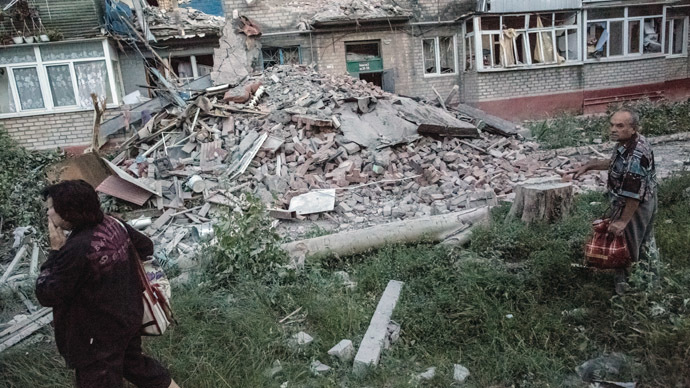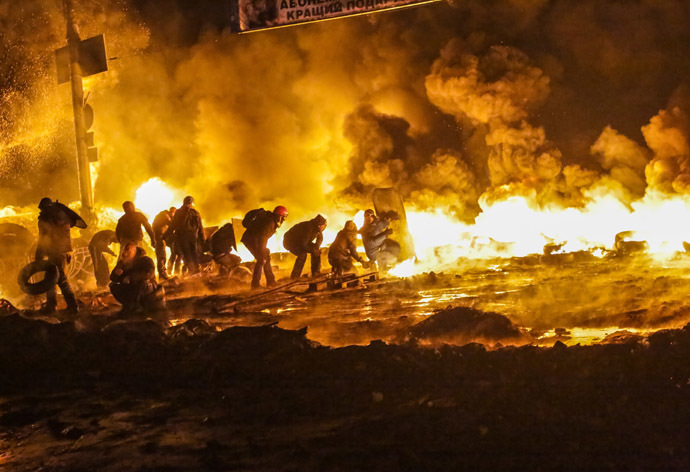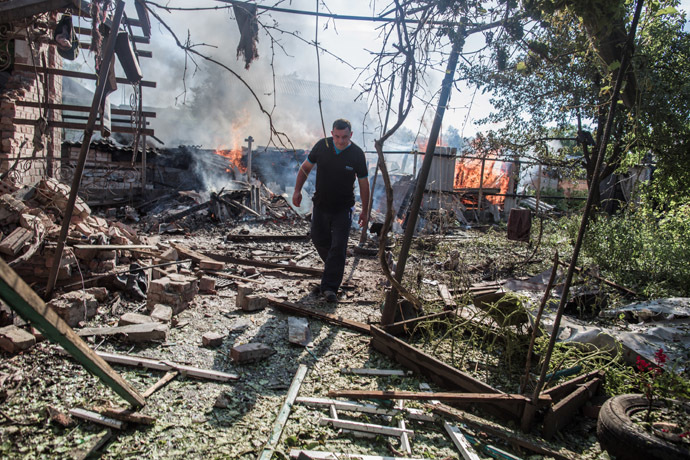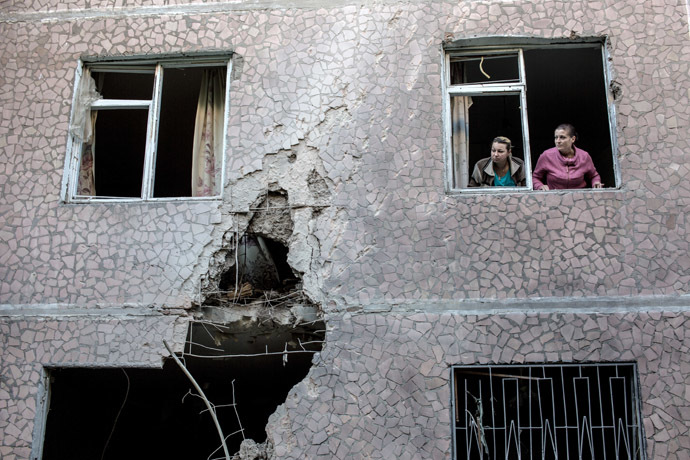Ukraine, the country no one cared about

Ukraine is the land where time has stood still and the consequences of what has been sown are now being reaped as anarchy is unleashed upon its rotting corpse.
Just over a year ago, in rather more peaceful times, I was on a train from Kharkov to Simferopol, sharing a cabin with two Russian gents from the Far Eastern outpost of Nakhodka and, breaking the monotony of long distance rail commutation, we were musing about the differences between Ukraine and Russia.
My travelling companions were journeying to visit close family who they hadn't met before - unusual to European ears but understandable when the distance between their home and Crimea is about the same as that between Paris and Chicago.
The two Russians spoke effervescently about the kinship between the nations and the fraternal ties but they did notice how decrepit and haggard the country looked by comparison with their homeland. "What have these guys being doing for twenty years? Even the escalator stairs in Kharkov train station was broken, I asked the woman at the station and she said it stopped working in 1995 but they never bothered to fix it," the older of the two, Sasha, told me.
I had noticed the 'ornamental' escalator myself but as I'd been in Ukraine many times before I was able to explain to my companions that the same bedraggled appearance and function was general all over the nation, so it hadn't surprised me. “Russia in the 90's,” they both exclaimed. I had heard this before - Ukraine is a place where time has stood still since 1991 and basic services have been allowed to rot and decay while neighboring lands have made attempts to modernize.
In my view, this is the central reason that inspired the violent overthrow of the previous Ukrainian government at Maidan earlier this year. It wasn't about the EU, the USA, Russia or NATO, it was prompted by frustration at 20 years of misrule by successive Ukrainian governments and by the Ukrainian people themselves who allowed it to happen. As Bill Clinton's Presidential campaign mantra-ed in the 90's “It's the economy, stupid.”
Now, sadly, as a consequence of Maidan, the economic situation has disintegrated to an even more calamitous level and Ukraine has 'over-taken' Moldova to gain the dubious honor of being Europe's poorest state when measured in average monthly incomes. This is due to the almost complete breakdown of civil society and the collapse of the hryvnia currency following the 'revolution' which has wiped out what little wealth households held.
According to Kiev's own figures, the average monthly net wage is now a paltry €173 a month. This is almost four times less than in neighboring Poland and nine times lower than in Moscow. Meanwhile, the richest Ukrainian, Rinat Akhmetov has a personal fortune of $12.6 billion according to Forbes and the new President Petro Poroshenko sits on $1.3 billion. Is it any wonder a large section of the public have had enough?

Broken country
"Things fall apart; the center cannot hold; Mere anarchy is loosed upon the world, the blood-dimmed tide is loosed, and everywhere the ceremony of innocence is drowned; the best lack all conviction, while the worst are full of passionate intensity," so wrote the Irish poet William Butler Yeats in 1919 in his seminal 'The Second Coming.'
Basically, bungling ineptitude, graft across all sectors of Ukrainian society and a general 'we don't care' attitude has reduced Ukrainians to penury while adjoining states have improved their living standards since Communism fell over twenty years ago - some faster than others. Of course, not all Ukrainians are poor, a small upper class has prospered since independence and continued to drive ever better cars on ever more battered roads and flaunt more expensive watches opposite worsening and grinding poverty.
This broken-down Ukraine is visible all over the fractured nation. If one enters via Lviv, the Western fulcrum of nationalism, you can see the horrendous sight of elderly people eating from rubbish bins all around the beautiful city center and power outages are a regular occurrence. In the industrial heartland of Krivoy Rog, the city is so badly lit at night, due to either lack of money or will, that you need a torch to walk the central streets. In the southern port city of Odessa, the pulchritudinous Russian built center is literally crumbling either because of indifference or a shortage of cash to maintain the myriad exquisite architectural marvels.
What most would charitably call roads are non-existent in places and even the artery from Lviv to the Polish border at Medyka (which is a major trading route) is in such disrepair that a 90km journey takes about two hours. Internal routes are in such a sorry state that many have the appearance that asteroids have hit them, but in reality are just afflicted by gigantic potholes that nobody has bothered to repair.
Corruption is widespread in Eastern Europe but Ukraine seems to be unique in that it permeates down to even the lowest levels of society. It is present everywhere, from the usual suspects like traffic police and city officials right down to schools and pension rights - even the 'child of Chernobyl' cards were being bought and sold some years back to enable holders to benefit from freebies . Driving licenses are mostly bought, not earned and it is practically impossible to graduate school or university without greasing a teacher's palm.

Comprehension issues
Considering students in Ukraine, generally, buy their Degrees and Diplomas, rather than earn them, it is doubtful that those who protested at Maidan were actually aware of what they are protesting for, and I am not joking. Most seemed unable to distinguish a deep and comprehensive free trade agreement (the association deal), from an offer for EU membership which is another matter entirely. Many of the protestors (especially the students) were under a misconceived fantasy that they would suddenly be allowed to emigrate to or at least travel freely to the more prosperous West. This is not the case and was never on the cards. In fact, the only country that appears to be opening its borders to Ukrainians fleeing the current Civil War is Russia - the EU frontier remains slammed shut.
Contrast Ukraine's decay with Russia's resurgence. Since the arrival of President Putin for his first term in 1999, and through the Medvedev years, and into Putin's 'second coming' Russian GNI per capita has increased more than tenfold, from $1,272 to $13,711 and Russia's share of Europe's GNI has jumped from 1.9% to 9.8%. (Source - Kushnirs, for the record)
Meanwhile, in the first 21 years of Ukrainian independence (1991-2012, their GNI fell from 10.1% of the Eastern European total to 5.3% and real incomes have been static or even declined. The situation is certainly even worse now, post-Maidan. With this in mind, is it any wonder that Crimeans are so overjoyed to have been re-united with Russia and that a large percentage of the citizenry of South Eastern Ukraine envy them and would also wish to join the Russian Federation?
During my frequent travels to Ukraine in recent years, I have built up a network of friends and acquaintances across the troubled territory and all of them have complained to me copiously about the economic damage wrought by Maidan. Even some Western Ukrainians, who enthusiastically supported the movement at first, have grown weary as reality bites and they realize that things have gotten worse and not better and that the EU is not going to allow them free movement in the foreseeable future. Of course, many of them believe it is a price worth paying for what they perceive to be 'progress' but even they are frightened of what IMF-enforced austerity will bring.
Concurrently, the mood in the South and East is rather less optimistic - most of them did not approve of the initial protests and even those who did have had enough as the upheaval passes the three-quarter of a year mark.
‘I don’t want to kill people in Donbass’
Tatyana from Nikolaev, who I first met in Kiev in 2010, left the capital after her company folded and returned to her home city in the spring. She is currently pondering whether to join the 110,000 Ukrainian refugees who have fled to Russia this year - not because her life is in danger but because she foresees a better future in Russia and sees the current state of chaos as an opportunity to move. I spoke with her on Skype and she told me her reasons.
"It's sad for me to realize this, but Ukraine doesn't exist anymore. The rulers of our country, they stuffed their pockets with money, when they were in power - all of them! That's all they ever did and nothing more. They looted and sold out the whole country and now they have split and quarreled and are playing their games on the people, the ordinary people like me and I have had enough," she told me. "My Mother has told me to run to Russia but I do not have family there. I do not know what to do. I am scared."
At the other side of the country in Lviv, my friend Nikola is also scared. But for a different reason - he's been called up to the military and is awaiting deployment. Recently, he messaged me frequently asking for help to relocate to Ireland - he's an extremely talented computer programmer and they are in huge demand in Dublin. On a personal level, I owe Nik a favor as he was inordinately helpful to me in Lviv a few years back. I told him I was writing this piece and he agreed to answer a few questions.
"I am a Ukrainian, I love this country and I love the language and I love the culture. My whole root is Western Ukraine and Lviv is my heart. I stood on Maidan last year and I loved the movement but it has been hijacked. Now I see that the Americans were playing us all along and that this was never about Europe and Europe was my dream. To bring it here, to be a part of it, to be a European."

"I am scared. I am not a soldier and I don't want to fight. I don't want to die for these politicians and I want to go back to my old work or escape. I can be sent to the East to fight any day now and this is how I live in fear," he explained.
Nik added with genuine pain: "The people in Donbas and Luhansk, they are Ukrainians like me and I don't want to kill them and I don't want to be killed by them either. I want this to stop, to end."
Another acquaintance, Julia, from Odessa is out of work and barely scraping by - she previous earned $700 a month as a translator for 'Marriage Tours' (a not-insignificant industry in the region). However, the hordes of (primarily) middle-aged Americans and Brits have ceased coming due to the violence and the aspirant brides are lonely. "There is no work now at all. I even tried the hotels, but they say foreign tourism to Odessa is gone this year and even the schools aren't hiring because nobody has money for English lessons - most people can barely feed themselves, let alone work on their English vocabulary."
"So many people are out of work." What are they doing instead I ask? "Many of them move to Russia and seek employment there, a small few went to Turkey to work without documents and the rest are just sitting on their sofas waiting for this madness to end."
When the delirious insanity does conclude and some measure of peace is restored to Ukraine and whether the South-Eastern region eventually returns to Kiev's control or not, the scars will take years or even decades to heal. There are the pockmarks of war, of course but the economic scabs will be harder to ameliorate once it's 'morning' again in Ukraine and they awake from this long, dark night of the collective soul.
Ukraine has never been 'one nation' in the way that other European states are, the fault-lines have always been transparent. But now that they have been opened and ruptured, it's doubtful they will readily repair.
In the economic sense, it is hard to see a great future for Ukraine. The EU trade deal is only worth €490 million per annum – by contrast, trade with Russia and Belarus is valued at €16 billion annually – and it is doubtful that Ukrainian goods will be able to compete on European markets in the first place. Throw in the war-damage to the already creaking infrastructure and the portents look very gloomy, not to mention the weariness of the population after the whole tumult.
What Ukraine needs now is not an EU association deal or an IMF austerity program; it's a Marshall Plan style aid package. The EU is too preoccupied with troubled existing members like Greece to even contemplate such a move and the US, for all its big talk and promises, hasn't even so much as suggested such a move. The only entity that might be willing and able to 'rescue' Ukraine's economy is Russia (perhaps in partnership with China) but after the events of this year it's doubtful whether even their Slavic brothers would be prepared to take such a gamble now given the fractured state of relations.
I have no idea how Ukraine's turmoil will end exactly, but I'm pretty certain it won't be good and that is a terrible shame. It really is time to pray for Ukraine, not in the sense that the phrase was commandeered by Maidan supporters on social media, but for the populace who are suffering so much.
To paraphrase Yeats, who I quoted earlier, "Romantic Ukraine is dead and gone, it’s with Bandera in the grave."
The statements, views and opinions expressed in this column are solely those of the author and do not necessarily represent those of RT.
The statements, views and opinions expressed in this column are solely those of the author and do not necessarily represent those of RT.













